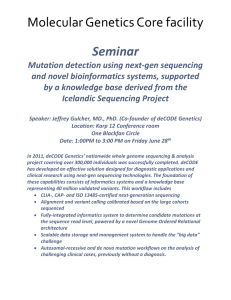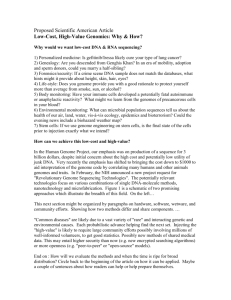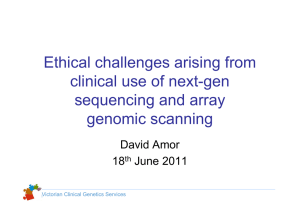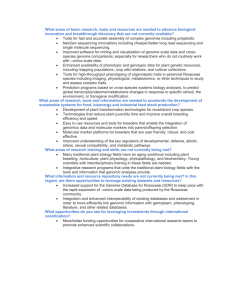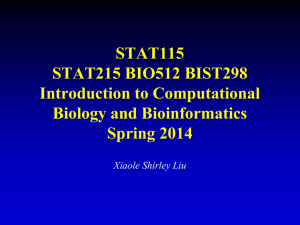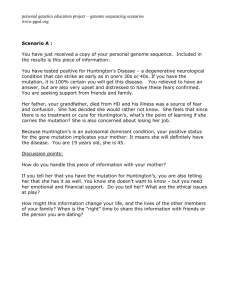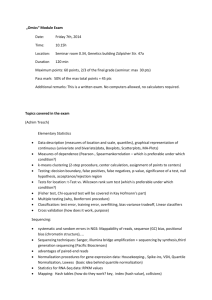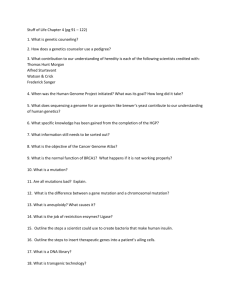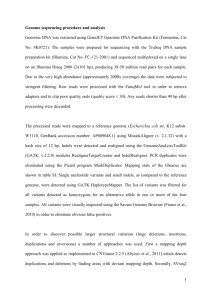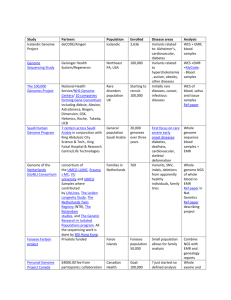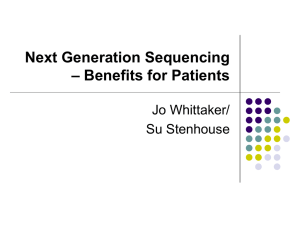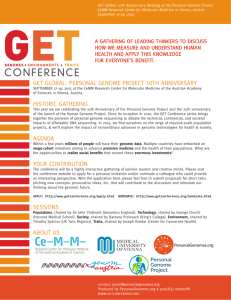PowerPoint Presentation PowerPoint
advertisement
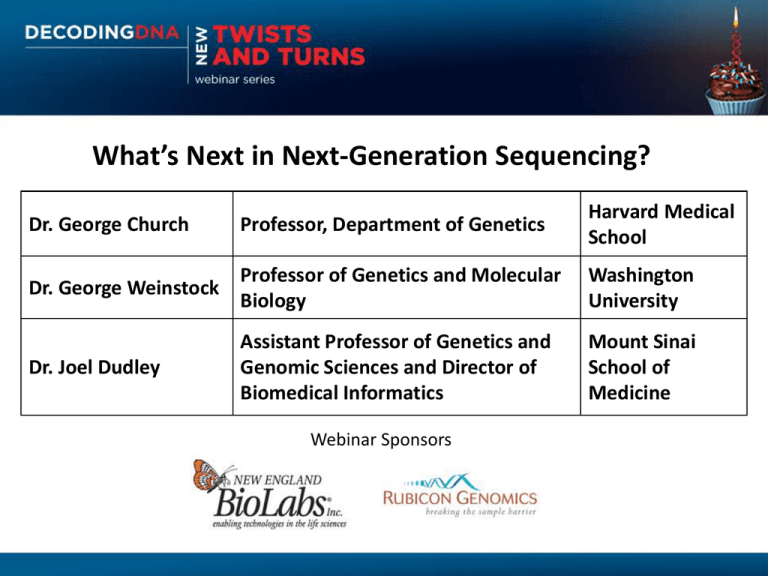
What’s Next in Next-Generation Sequencing? Dr. George Church Professor, Department of Genetics Harvard Medical School Dr. George Weinstock Professor of Genetics and Molecular Biology Washington University Dr. Joel Dudley Assistant Professor of Genetics and Genomic Sciences and Director of Biomedical Informatics Mount Sinai School of Medicine Webinar Sponsors 60 yr + 3D 1953 3D-generic DNA Franklin, Gosling, Watson, Crick, Wilkins, Stokes, Wilson 1965 1D-RNA sequence Holley, Everett, Madison, Zamir 1977 3D-RNA Rich, et al. Klug, et al. Kim, et al. 2013? Complete 1D genome? 3D-genome? 3D-transcriptome? Optimistic’ exponential extrapolation From $3 billion to an affordable genome DNA sequencing 1E+13 1E+12 1E+11 When? 1E+10 1E+9 1E+8 6 decades & Moore's law 1.5x/yr for electronics 1E+7 1E+6 1E+5 1E+4 1E+3 1965 1970 1975 1980 1985 1990 1995 2000 2005 2010 2015 2020 2025 2030 2035 2040 3 From $3 billion to an affordable genome Early arrival 1E+13 1E+12 1E+11 When? 1E+10 1E+9 6 years 1E+8 DNA sequencing & Moore's law 1.5x/yr for electronics 1E+7 1E+6 1E+5 1E+4 1E+3 1965 1970 1975 1980 1985 1990 1995 2000 2005 2010 2015 2020 2025 2030 2035 2040 4 Sequencing via Imaging. Clinical Accuracy Haplotype phase: 2 mutations in cis vs trans 1.43 Mbp LFR CGI/Harvard: Peters, et al. Nature July 2012 10 cells 384 aliquots, ~200 kb size 1 error per 10 million bp (Q70) ! Accurate genome = only 4 Mbytes. Nanopore : Polymer vs Monomer vs NanoTag 1988-1995: Church, Deamer, Branton, Baldarelli, Kasianowicz. GG TTT CCC 2012: Oxford & Genia AAA 2009 Clarke, Bayley, et al 2010 Derrington, Gundlach, et al 2012 Cherf, Akeson, et al 5′ GCAACAGAGCCAGC CCC 6 GCAACAGAGCCAGC AAA GCAACAGAGCCAGC CCC 6 GCAACAGAGCCAGC TTT GCAACAGAGCCAGC GG A A15 3′. Nanopore: Polymer vs Monomer vs NanoTag A C “accuracy better than 1 in 5x108 events” G T PEG-Labeled PP: Ju, Kasianowicz, et al. Scientific Reports 2012 Fluorescent in situ Sequencing (FISSEQ) 60 cycles x 4 colors (3D omes) Single base differences Lee, Yang, Terry, Nilsson, Church et al. 8 Danaher Polonator 2013: Automation & Image Processing Lee, Terry, Daugharty, Turczyk, Scheiman, Yang, Li, Nick Conway; Collaborators --- Kun Zhang, Angela de Pace lab, Feng Zhang, Nilsson ISH probe trimming to prevent selfcircularization ssDNA intramolecular circularization RCA primer hybridization RCA with aminoallyl dUTP U DNA ISH probe aUaU 5’ phos Fluorescent probe hybridization or sequencing pm Cy Nu Cy pm Nu nm USER cleavage aU aU RCA primer aU aU 14 12 10 8 6 4 2 0 500 Signal/Backgro und Abs Intensity 400 300 200 100 0 0 10 20 30 40 50 60 Re-probing cycles 0 1 2 aU aU Sequencing-byligation (1 z-slice shown) A G C T 3 Displacement (um) Phi29 RCA Amplicon immobilization using BS(PEG)9 pm Frequency Probe immobilization using BS(PEG)9 RNA •••••••••••••••••••••••••• RFU Probe extension with aminoallyl dUTP 6 base sequencing (1 z-slice shown) Human fibroblast All RNAs GAPDH How can we improve genome interpretation? How we can make human omics data and cells shareable world-wide? Genomes + Environments = Traits PersonalGenomes.org (US, Canada, UK, EU goals: 100,000 volunteers each) evidence.personalgenomes.org Therapies PERSONAL GENOME 3M alleles Immunome Immunome Stem-cells Epigenome (RNA,mC) Cancer TRAITS (Phenome) Microbiome Chemicals Nutrition 13 Genomes Environments Traits (GET) • • • • World’s only open access data sets Consented for re-IDentification 100% on Exam – Educate first Stem Cell Biobank 0431 1660 1070 1846 1677 1730 1731 1687 1833 1781 14 NIST + FDA + PGP Genome Standards genomeinabottle.org “enthusiastic about using samples from the Harvard University's Personal Genome Project, which are broadly consented”, Salit said. Re-identification & commercial use http://www.genomeweb.com/sequencing/nist-consortium-embarks-developingmeter-stick-genome-clinical-sequencing 15 N=1, Genome actionability Volker: Intestinal surgery XIAPCord blood Beery twins: Cerebral palsy SPRDiet 5HTP Wartman: Leukemia FLT3Sunitinib Gilbert: Healthy BRCA Mas/Ovarectomy Snyder#82: Healthy GCKR, KCNJ11Diet, exercise Smarr#74: Crohn’s IL23R Diet, probiotics Bradfield: Healthy CDH1 Gastrectomy PGEd.org 10/18 SupercentenarianStudy.com rare protective alleles Calment 122.4 Breuning 114.6 Mortensen 115.7 Mirabella 110.6 Correlation → Cause → Cure/Prevention Rare Protective alleles •MSTN •LRP5 •PCSK9 •CCR5 •FUT2 •APP -/- Lean muscles -/+ Extra-strong bones -/+ Lower coronary disease -/- HIV-resistant -/- Stomach flu resistant -/+ Alzheimer’s blog.personalgenomes.org <0.001% 0.001-8% 3, 0.06% ~0, 1% 20% 0.4% 18 18 N=1, Cause Cure "Long-Term Control of HIV by CCR5 Δ32/Δ32 Stem-Cell Transplantation" 2009 New England J Medicine 2007 Leukemia & AIDS: Timothy Ray Brown 2012: Sangamo Phase 2 clinical trial 19 19 Cas9 CRISPR RNA-guided human genome engineering. Science in press Mali, Yang, Esvelt, Aach, Guell, DiCarlo, Norville, Church Brain Activity Map (BAM+PGP) Genes Environments Traits PersonalGenomes.org Biswal etal PNAS 2010 21 21 What’s Next in Next-Generation Sequencing? Dr. George Church Professor, Department of Genetics Harvard Medical School Dr. George Weinstock Professor of Genetics and Molecular Biology Washington University Dr. Joel Dudley Assistant Professor of Genetics and Genomic Sciences and Director of Biomedical Informatics Mount Sinai School of Medicine Webinar Sponsors
